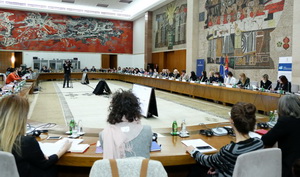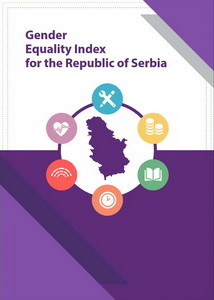 During the presentation of the results of the new Gender Equality Index for the Republic of Serbia, Deputy Prime Minister of the Republic of Serbia and President of the Coordination Body for Gender Equality Zorana Mihajlović noted that “in under three years Serbia has made significant progress in the Gender Equality Index, now amounting to 55.8 points, and the difference compared to the EU has been reduced. These results clearly indicate that we are dedicated to the improvement of the status of women in Serbia, but also that we need to work even more, through coordinated activities of state institutions and the civil sector, with the support of international partners”.
During the presentation of the results of the new Gender Equality Index for the Republic of Serbia, Deputy Prime Minister of the Republic of Serbia and President of the Coordination Body for Gender Equality Zorana Mihajlović noted that “in under three years Serbia has made significant progress in the Gender Equality Index, now amounting to 55.8 points, and the difference compared to the EU has been reduced. These results clearly indicate that we are dedicated to the improvement of the status of women in Serbia, but also that we need to work even more, through coordinated activities of state institutions and the civil sector, with the support of international partners”.
She noted that the results show where we have made progress, and where we need to work more. “We have the best results regarding the domain of power and inclusion of women in the political life, we have made a progress of 9.3 points, coming in at 16 – so we are better than half the EU member states. On the other hand, we must invest more effort in the domains of money and time, because women still make less than men for the same work, and spend much more time in unpaid work through caring for the household and children”, she said.
The Deputy Prime Minister noted that the Gender Equality Index places us among the group of countries we are comparing ourselves with, thanks to the support of the European Institute for Gender Equality.
Virginija Langbakk, Director of the European Institute for Gender Equality, stated that Serbia is the only country outside the EU that has produced a Gender Equality Index, and did so for the second time, showing the dedication of the state and the Coordination Body to this work.
“Serbia has made progress in all domains and is showing a strong commitment to improving gender equality. Thus Serbia represents an example of good practice for other countries in the region, along their path towards the European Union”, said Langbakk.
Mateja Norčić Štamcar, Deputy Head of the EU Delegation to Serbia, stated that gender equality is a European value and fundamental human right, and that the EU is paying increasing attention to this topic.
“The index helps us create policies in this area. We are glad that Serbia has improved its result, because this will help us in our joint fight against discrimination, violence and social exclusion. The European Union will continue to support Serbia both politically and financially in this and similar initiatives”, said Norčić Štamcar.
 Dragana Jovanović Arijas, Manager of the Social Inclusion and Poverty Reduction Unit of the Government of the Republic of Serbia, said that the results of the Index show us where we have achieved positive trends, but also where we need additional efforts.
Dragana Jovanović Arijas, Manager of the Social Inclusion and Poverty Reduction Unit of the Government of the Republic of Serbia, said that the results of the Index show us where we have achieved positive trends, but also where we need additional efforts.
“We must pay particular attention to topics such as the use of time, since women spend much more time caring for the household, while men have more time for personal development, and also support for women from vulnerable groups, because they are at a greater risk of poverty, and the introduction of gender perspectives in all public policies”, said Jovanović Arijas.
The Gender Equality Index was developed through the cooperation of the Coordination Body for Gender Equality, Social Inclusion and Poverty Reduction Unit and the Statistical Office of the Republic of Serbia, with support by the European Institute for Gender Equality.
In 2016 the Index for Serbia was at 52.4 points, with the difference compared to the European average amounting to 12.6 points, while the latest Gender Equality Index for Serbia amounts to 55.8 points, compared to the EU average – 66.2 points.
Click here to download the Gender Equality Index in the Republic of Serbia (.pdf).
Source: www.rodnaravnopravnost.gov.rs
 Government of the Republic of Serbia
Government of the Republic of Serbia















 pdf [271 KB]
pdf [271 KB]
Leave a Comment